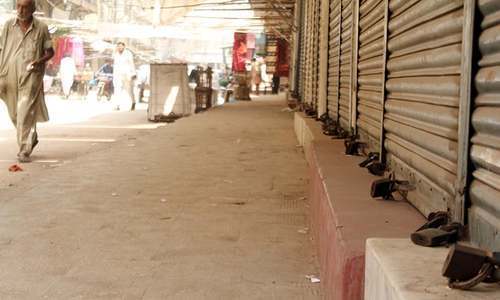Traders observe nationwide strike to resist govt drive to document commercial activity

A test of the PTI government and its budget policies began on Saturday as traders all over the country answered a nationwide call to strike in protest against a drive by revenue authorities to document commercial activity in the country.
The call for the shutter-down strike was given by various traders' bodies around the country, who want the government to revoke documentation requirements introduced to better assess their tax liability and roll back taxes.
There are hundreds of trader associations in Pakistan, and millions of traders who participate in the retail sector. However, while some groups rallied hard around the strike call, there was no clarity about how big the scope of the strike actually was as the main chambers of commerce and industry, from Karachi to Lahore and other cities of Punjab, did not support the call.
Critics also said the strike is nothing more than an attempt by traders to blackmail the government into maintaining status quo and keeping the economy undocumented to avoid income taxes. On discussions on social media, citizens criticised the striking traders and accused them of evading their tax liabilities by refusing to let the government document their activities.
Karachi
Major markets of Karachi observed a shutter-down strike on the call of traders.
"The strike call was given on the basis of a host of unresolved issues, ranging from an increase in be bracket of taxable income to the mandatory procurement of national identity cards (NICs) from customers conducting transactions worth Rs5 million or above," said Atiq Mir, chairman All Karachi Tajir Ittehad, a representative body of around 400 markets in the city.
Mir claimed that major markets in Clifton, Defence, Saddar, Tariq Road and 100 markets were deserted in response to the strike call today.
He claimed that at certain places, authorities had tried to get markets opened and allegedly also misled media about strike.
He said that he, personally, was against such strike as it results in financial losses.
"However by increasing sales tax on retail and asking traders to give record of every sale and purchase, traders have been compelled to take this drastic action."
Lahore
In Lahore, all large shopping hubs remained shut. Mall Road, Anarkali market, Shah Alam market and Bernadette road, Rehman Galliyan, Railway Road and Akbar Mandi remained shut for all business activities.
In a press conference, traders from the All Pakistan Traders' Union said that traders "from Karachi to Khyber" had answered the call to observe the strike.
"Traders have cast their referendum against the budget by observing this strike," said Naeem Mir, secretary of the All Pakistan Traders' Union.
"Mr prime minister, we want to solve traders' issues through talks. The government should sit us down with their representative to solve these issues," he said.
"If the government does not agree to our terms, then protest is the only way forward for us. We will not file our tax returns until our demands are met," he threatened.
Islamabad
A complete shutter-down strike was also observed in Islamabad after no government official contacted traders for any reconciliation effort.
Ajmal Baloch, president of All Pakistan Traders Association, said that Federal Board of Revenue and government only hold talks with chambers and avoids smaller traders.
He said 4.1 million registered traders have been ignored by government. He said, "Today's shutter-down is not only being observed by traders, in fact, it also channels the voice of consumers."
Khyber Pakhtunkhwa
Shangla, Kohistan, Battagram, Torghar traders are also observing a shutter-down strike against taxes and inflation.
"We have observed a historical shutter-down strike in Battagram. The strike is against inflation and proposed taxes being imposed on traders. The government is trying destroy our businesses," said Abdul Ghafar, president of Battagram's trade union.
He said inflation is now out of the control of the government and said that "the prime minister has pushed the country into an economic crisis."
Shangla Trade Union President Hamidur Rehman said that the Malakand division has been a tax-free zone since Swat became a state but the current government has decided to impose taxes here as well.
“We are already badly affected by terrorism and natural disasters and the imposition of taxes on us will be more than a disaster for us. Instead of conducting development work in our destroyed region, the government's decision of imposing taxes and inflation is beyond my understanding,” he said.
The shutter-down strike is being observed in all parts of Malakand and Hazara divisions. The strike against inflation and taxes was called by the Pakistan Trade Union.
The markets in Shangla, Battagram, Swat, Abbottabad, Haripur, Kohistan and other areas of the province remained deserted.
Quetta
Traders across Balochistan observed a complete shutter-down strike against inflation and increasing taxes on the traders' community.
The trade leaders had issued a call for the strike in order to mount pressure on the government to take steps to reduce inflation and taxes. In Quetta, all shops, shopping malls and business centres remained shut during the day.
Because of the strike, roads in Quetta also wore a deserted look and the flow of traffic was thin.
The strike against inflation was also observed in other cities of Balochistan.













































